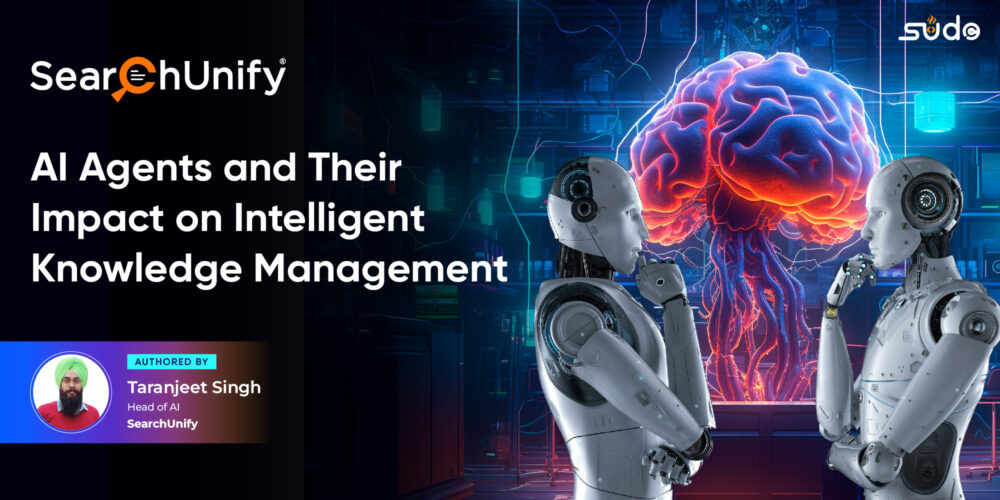
As enterprises scale, managing and utilizing vast amounts of knowledge becomes daunting. Traditional knowledge management systems fall short, hindering responsiveness to market demands, agility, and customer demands. That’s how AI-based knowledge management solutions like AI agents pitch in, transforming how businesses handle, distribute, and utilize information. These AI Agents leverage advanced language models to seamlessly integrate, organize, and retrieve data, transforming unstructured data into structured knowledge accessible to the enterprise.
That being said, let’s find out how the entry of AI agents in knowledge management helps transform the internal knowledge ecosystems.
Defining AI Agents in Knowledge Management
AI Agents in knowledge management are intelligent systems designed to assist enterprises in managing and utilizing their knowledge resources effectively. These agents leverage artificial intelligence techniques such as natural language processing (NLP), data analytics, and machine learning, to enhance the retrieval, organization, and dissemination of knowledge.
Here’s how AI agents function in Knowledge Management:
1. Information Retrieval: AI agents can quickly search through vast databases to find relevant information, helping users access the knowledge they need without extensive manual searching.
2. Content Organization: They can categorize and tag information automatically, ensuring that knowledge is organized logically and is easily accessible.
3. User Interaction: AI agents can interact with users through chatbots or virtual assistants, providing answers to queries in real time and guiding users to relevant resources.
4. Learning and Adaptation: These agents can learn from user interactions, improving their responses over time and adapting to the specific needs of the organization.

AI Agents For Knowledge Management With Examples
In the customer support industry, AI agents transform the way enterprises handle information and improve service delivery. Let’s understand this with a simple example:
A leading customer service provider faced challenges in managing a huge repository of client inquiries and resolutions. Also, traditional knowledge management systems were inefficient, leading to delays in response times and inconsistent information. So, to address these issues, they implemented an AI agent tailored to customer support. Now, the AI agent operates via the following key functions:
- Environmental Perception: To continuously monitor incoming customer inquiries along with trends and urgent issues.
- Tool Utilization: To access the knowledge base and CRM systems for gathering relevant information for accurate responses.
- Decision-Making: To analyze data-driven insights for timely solutions that are aligned with customer service objectives.
- Adaptive Learning: To learn from past interactions, refine responses and improve efficiency with time.
- Problem Resolution: To automatically categorize and escalate intricate issues while providing instant answers to the most common queries.
So, now that we’ve established how AI agents operate within customer support contexts, let’s examine the broader role of knowledge-based agents in this dynamic landscape.

Role of Knowledge-Based Agents
Knowledge-based agents in AI are systems designed to understand, reason, and provide solutions based on structured and unstructured data. In short, AI agents automate tasks, streamline decision-making, and enhance discovery by leveraging AI techniques like machine learning, natural language processing (NLP), and semantic analysis.
Example:
Imagine a customer support team using a knowledge-based agent powered by AI to resolve technical queries. These agents can instantly pull relevant case studies, articles, or troubleshooting guides, reducing ticket resolution time.
Key Roles of AI Agents in Knowledge Management:
- Information Retrieval: Quickly find and suggest relevant data from vast repositories.
- Content Organization: Tag, classify, and summarize knowledge for easy access.
- Knowledge Generation: Analyze data, identify patterns, and create actionable insights.
- Decision Support: Predict outcomes and provide data-driven recommendations.
- Continuous Learning: Adapt to user interactions and evolving needs.
- Automation: Handle repetitive tasks like tagging and summarization.
These agents empower organizations to harness data effectively, foster innovation, and drive smarter decisions for a competitive edge.
With the understanding of their roles established, we can now look at the benefits that these AI Agents serve within knowledge management.
Benefits of AI-Powered Knowledge Management Tools
| Advantages | Impact on Business |
| Faster Access to Information | Reduces time spent searching for data. |
| Enhanced Decision-Making | Provides actionable insights at scale. |
| Cost-Effective Solutions | Decreases dependency on manual processes. |
| Consistent Knowledge Updates | Ensures content is always relevant and accurate. |
| Improved Customer Experience | Provides faster and more accurate responses to queries. |
Exemplifying AI Agents in Knowledge Management
1. Automated Support with AI Agents
- Example: ChatGPT-powered chatbots integrated with a knowledge base.
- Impact: Reduced ticket resolution time by 40%, improving customer satisfaction.
2. Proactive Knowledge Delivery
- Example: AI agents delivering knowledge snippets to employees in real-time during calls.
- Impact: Increased employee productivity by 25%.
3. Knowledge Gap Analysis
- Example: AI agents identifying outdated or missing content in knowledge bases.
- Impact: Enhanced knowledge accuracy and relevance.

AI Agents in Action: Transforming The Future of Knowledge Management
SearchUnify plays a pivotal role in advancing AI-powered knowledge management. Its suite of AI-driven products, like intelligent search and knowledge management solutions, empowers enterprises to seamlessly capture, organize, and retrieve information. By leveraging machine learning, natural language processing, and analytics, SearchUnify helps create intuitive and actionable knowledge ecosystems.
For instance, its intelligent search capabilities ensure users access the right information at the right time, while the AI-powered knowledge base proactively identifies content gaps and enhances decision-making. These innovations drive efficiency, collaboration, and customer satisfaction—aligning perfectly with the transformative potential of AI in knowledge management.
Frequently Asked Questions
1. How do AI Agents revolutionize traditional knowledge management systems?
AI agents automate data organization, retrieval, and content updates, making information easily accessible and actionable.
2. What are the advantages of using AI agents in knowledge management?
They enhance efficiency, foster collaboration, and provide personalized, data-driven insights for better decision-making.
3. How do AI agents process and organize unstructured data?
Using NLP and machine learning, they analyze, categorize, and structure unorganized data for seamless retrieval.
4. How do AI agents continuously learn and improve their capabilities?
They evolve through adaptive learning, leveraging user interactions and feedback to refine performance over time.
5. How do AI agents support continuous learning in knowledge management?
They evolve by learning from interactions and feedback, improving performance over time.













